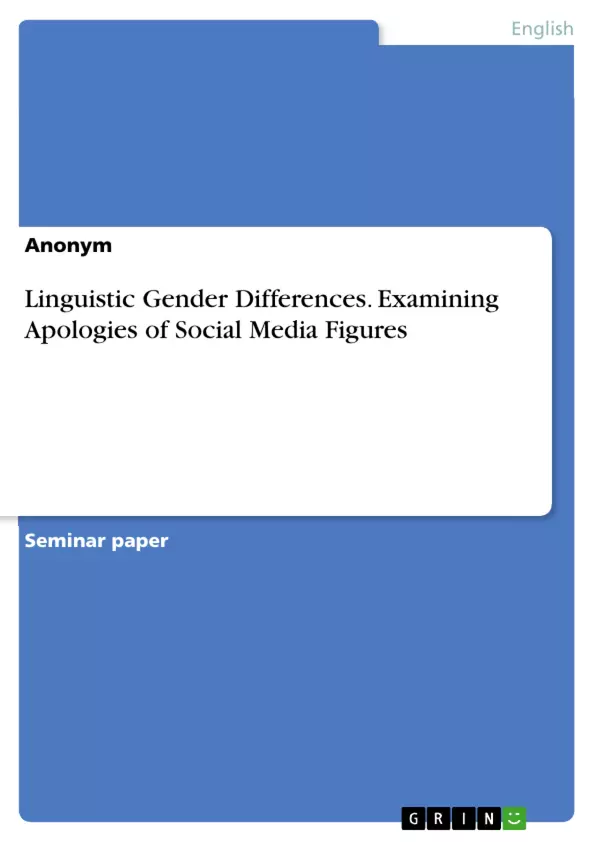This term paper looks at politeness behaviour from a gender perspective. The author focuses her investigation on apologies as speech acts. In order to analyse the differences between the two genders, she investigates several apology videos of YouTubers from the U.K and the U.S, who have reached a certain level of popularity among young viewers.
The author analyzes the strategies the YouTubers use to apologize to their viewers for various missteps they made earlier and in the process exposes some strategic mistakes in these apologies. Even though the differences between the genders when it comes to the wording of apologies are not clear cut, there a certain tendencies which are interesting to look at. These sociolinguistic differences mainly come from the high correlation between the use of language of a person and their social background, society norms, standards and expectations on gender behaviourism.
The question, if real language differences exist between the genders, needs further consideration, because it also depends on the individual and the context. In this essay, the author focuses on people who have a certain media presence (i.e. on YouTube) and reach a large young audience. They have to choose their words very carefully in order to retain and/or regain a positive image and to reduce the danger of losing their followers. Just by examining a certain (limited) number of different sources, it becomes clear that women and men not only regard and react to apologies differently but also use them in different proportions and for different purposes.
Inhaltsverzeichnis (Table of Contents)
- Introduction
- Speech Acts
- Apology as a Speech Act
- Apology as a Negative Politeness Device
- Apology Strategies
- Apology Strategies used by Men
- Apology Strategies used by Women
- Further Contrasts between the two Genders
- Conclusion
- References
Zielsetzung und Themenschwerpunkte (Objectives and Key Themes)
This term paper aims to analyze politeness behavior from a gender perspective, focusing specifically on apologies as speech acts. The author examines apology videos of popular YouTubers from the U.K and U.S. to identify strategies used to apologize for missteps and reveal potential strategic mistakes. The paper explores how gender influences apology strategies and explores whether these differences reflect or even create social divisions on gender.
- Gendered differences in apology strategies
- The role of social norms and expectations in shaping apology behavior
- The function of apologies in maintaining social harmony
- The influence of media presence and audience engagement on apology strategies
- The relationship between language and gendered social divisions
Zusammenfassung der Kapitel (Chapter Summaries)
- Introduction: This chapter introduces the topic of apologies and their role in politeness behavior, particularly in the context of gender differences. It highlights the influence of social norms and expectations on language use and introduces the research focus on YouTubers and their apology strategies.
- Speech Acts: This chapter provides an overview of speech act theory and its central concepts, including the distinction between locutionary, illocutionary, and perlocutionary acts. It explores how gender and other social attributes can affect the success of intended perlocutionary acts.
- Apology as a Speech Act: This chapter defines an apology as a speech act and discusses its function as a remedial interchange aimed at restoring social harmony. It introduces various models of apologizing and emphasizes its importance in maintaining politeness in different speech communities.
Schlüsselwörter (Keywords)
This paper focuses on the key concepts of apologies as speech acts, gendered differences in communication, politeness strategies, social norms, social harmony, and the relationship between language and gender. It analyzes apology strategies used by YouTubers and examines the impact of these strategies on their audiences, drawing on theories of speech acts and politeness.
Frequently Asked Questions
Do men and women apologize differently on social media?
Yes, the research shows that men and women use apologies in different proportions and for different purposes, often reflecting social norms and expectations regarding gender behavior.
What is a "speech act" in the context of an apology?
An apology is a speech act intended to restore social harmony after a misstep. It involves locutionary, illocutionary, and perlocutionary components to achieve a remedial interchange.
Why do YouTubers need to be careful with their apologies?
Public figures must use apologies strategically to retain or regain a positive image and avoid losing followers. A poorly executed apology can further damage their reputation.
What are "negative politeness devices"?
In sociolinguistics, apologies often function as negative politeness devices, aimed at minimizing the imposition on the listener and maintaining social distance or respect.
How do social norms influence linguistic gender differences?
Linguistic differences correlate highly with social background and society's standards. These norms shape how individuals choose their words based on gendered expectations of behavior.
- Arbeit zitieren
- Anonym (Autor:in), 2019, Linguistic Gender Differences. Examining Apologies of Social Media Figures, München, GRIN Verlag, https://www.grin.com/document/1360077



